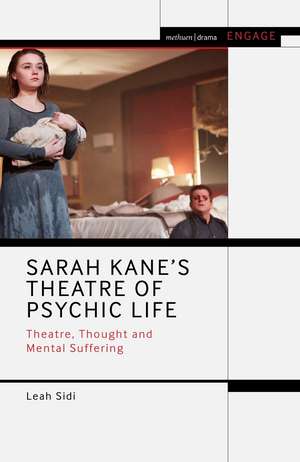Sarah Kane’s Theatre of Psychic Life: Theatre, Thought and Mental Suffering: Methuen Drama Engage
Autor Leah Sidien Limba Engleză Hardback – 5 apr 2023
Din seria Methuen Drama Engage
- 14%
 Preț: 178.65 lei
Preț: 178.65 lei - 33%
 Preț: 134.00 lei
Preț: 134.00 lei - 30%
 Preț: 508.80 lei
Preț: 508.80 lei - 21%
 Preț: 215.79 lei
Preț: 215.79 lei - 14%
 Preț: 178.65 lei
Preț: 178.65 lei - 14%
 Preț: 178.65 lei
Preț: 178.65 lei -
 Preț: 470.80 lei
Preț: 470.80 lei -
 Preț: 446.80 lei
Preț: 446.80 lei - 14%
 Preț: 179.98 lei
Preț: 179.98 lei - 22%
 Preț: 230.86 lei
Preț: 230.86 lei -
 Preț: 190.06 lei
Preț: 190.06 lei - 30%
 Preț: 537.95 lei
Preț: 537.95 lei - 30%
 Preț: 509.30 lei
Preț: 509.30 lei -
 Preț: 233.08 lei
Preț: 233.08 lei - 22%
 Preț: 232.54 lei
Preț: 232.54 lei - 30%
 Preț: 567.17 lei
Preț: 567.17 lei - 22%
 Preț: 656.47 lei
Preț: 656.47 lei - 23%
 Preț: 222.84 lei
Preț: 222.84 lei - 22%
 Preț: 231.16 lei
Preț: 231.16 lei - 30%
 Preț: 539.00 lei
Preț: 539.00 lei - 30%
 Preț: 538.09 lei
Preț: 538.09 lei - 30%
 Preț: 597.56 lei
Preț: 597.56 lei - 14%
 Preț: 178.93 lei
Preț: 178.93 lei - 30%
 Preț: 596.55 lei
Preț: 596.55 lei - 22%
 Preț: 223.85 lei
Preț: 223.85 lei - 13%
 Preț: 180.88 lei
Preț: 180.88 lei - 30%
 Preț: 566.78 lei
Preț: 566.78 lei - 13%
 Preț: 179.98 lei
Preț: 179.98 lei - 30%
 Preț: 538.26 lei
Preț: 538.26 lei - 13%
 Preț: 229.96 lei
Preț: 229.96 lei - 30%
 Preț: 539.42 lei
Preț: 539.42 lei - 23%
 Preț: 223.10 lei
Preț: 223.10 lei - 30%
 Preț: 568.06 lei
Preț: 568.06 lei - 22%
 Preț: 834.28 lei
Preț: 834.28 lei -
 Preț: 172.74 lei
Preț: 172.74 lei - 22%
 Preț: 655.50 lei
Preț: 655.50 lei
Preț: 508.80 lei
Preț vechi: 591.62 lei
-14% Nou
Puncte Express: 763
Preț estimativ în valută:
97.36€ • 101.86$ • 80.88£
97.36€ • 101.86$ • 80.88£
Carte tipărită la comandă
Livrare economică 03-17 aprilie
Preluare comenzi: 021 569.72.76
Specificații
ISBN-13: 9781350283121
ISBN-10: 1350283126
Pagini: 232
Dimensiuni: 138 x 216 x 20 mm
Greutate: 0.41 kg
Editura: Bloomsbury Publishing
Colecția Methuen Drama
Seria Methuen Drama Engage
Locul publicării:London, United Kingdom
ISBN-10: 1350283126
Pagini: 232
Dimensiuni: 138 x 216 x 20 mm
Greutate: 0.41 kg
Editura: Bloomsbury Publishing
Colecția Methuen Drama
Seria Methuen Drama Engage
Locul publicării:London, United Kingdom
Caracteristici
A new framework for understanding the relationship between the theatrical space and the mind in experimental theatre, drawing on psychoanalysis, performance studies and neuroscience.
Notă biografică
Leah Sidi is Lecturer in Health Humanities at University College London, UK. Her research focus is on contemporary theatre and mental health, with a special focus on feminist theatre and psychoanalysis. She has been the recipient of the Feminist Review Archive Award and a Wellcome/ISSF postdoctoral award at Birkbeck, University of London, UK. She has published in Performance Research and is a regular contributor to the Institute for Medical Humanities' The Polyphony.
Cuprins
Introduction: Revisiting Kane- Why Kane? - The question of biography: mental health and politics- Context: Mental Health in the 1990s: Phaedra's Love and 'community care plays'Chapter 1: Plays and playing: The Dramaturgy of Psychic Life- A Starting Point: Experientialism and the mind- Dramaturgy- Theatre and thought- Psychic life and psychoanalysis- Crave with Paine's Plough (1998): Exploring ExperientialismChapter 2: The stage as traumatic space- Kane's Feminist Legacies: Feminist theatre and sexual trauma - Theatre as a theoretical response? PTSD and mimetic traumas- Blasted : The psychic life of sexual trauma- Blasted at the Crucible: A trauma readingChapter 3: Rhythm, Interruption, Psychosis- Phaedra's Love to Cleansed: A dramaturgical turning point- Dramaturgical tools: Prediction and interruption in Cleansed and Crave- A cognitive reading: Psychosis and prediction errors- Influence on Kane from Strindberg and Artaud- Cleansed at the National Theatre: Playing it against the textChapter 4: The Mind as Theatrical Site- Crave and 4.48 Psychosis as 'mental health' plays- The mind-as-site- Neoliberal healthcare and psychosis: dramaturgical responses to political changes- 4.48 Psychosis at the Lyric Hammersmith: splitting the mind into spaceChapter 5: RSVP ASAP- Kane and desire: What does theatre want? - Suicidality: returning to Kane's sources- Staging desire: An apostrophic reading with Barbara Johnson- 4.48 Psychosis by the Belarus Free Theatre: Queer love and suicidalityConclusion: Looking ahead: Kane and the future of 'mental health'BibliographyIndex
Recenzii
Sarah Kane's Theatre of Psychic Life is an incisive and eloquent account of the necessity of Kane, the necessity of theatre, and the necessity of interdependence. Sidi's book offers a persuasive argument for the fecundity of desolation.
Though Sarah Kane's work is steeped in despair, this fascinating and compassionate book offers hope in its vision of her theatre as a place where our darkest and most intensely personal experiences are transformed into an investigation into the political and psychological landscape of our society.
Though Sarah Kane's work is steeped in despair, this fascinating and compassionate book offers hope in its vision of her theatre as a place where our darkest and most intensely personal experiences are transformed into an investigation into the political and psychological landscape of our society.
